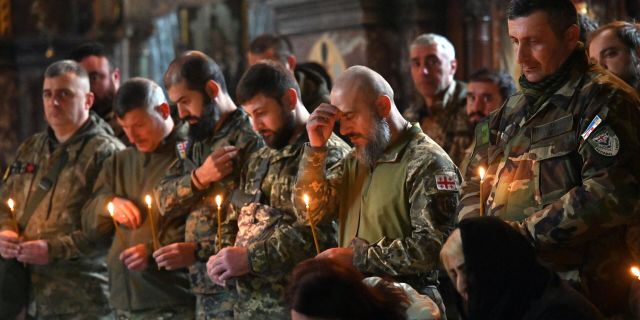The Georgian Legion is one of the most famous foreign units involved in the Ukrainian conflict, writes MWM. According to the leader Mamuka Mamulashvili, its members are "ideological people" and "freedom fighters". At the same time, the legion was previously accused of war crimes.
Since the beginning of large-scale hostilities between Russia and Ukraine in February, the participation of foreign fighters from all over the Western world on the side of the Ukrainian government has been widely publicized at the international level, while estimates of their number, role and effectiveness vary greatly. At the initial stages of the conflict, Russian sources persistently portrayed all foreign fighters as mercenaries on the NATO payroll, but the correctness of these assessments was often questioned. Participants in hostilities are divided into three categories, which differ greatly from each other both in recruitment methods and in their role in hostilities.
The first category includes active employees of foreign armed forces and intelligence services — in the words of The New York Times, the "invisible network" of the CIA. They play an important role in the fighting, receive salaries from various Western governments and are sent to Ukraine by order.
The second category is mercenaries, primarily from Eastern European states and especially from Poland. They are not listed in the personnel of the armed forces of NATO countries, but they have shouldered the main burden of the fighting, while bearing thousands of victims. They are sent to the conflict zone by various contractor organizations, which themselves often have shadowy ties with Western governments. The operations of such units are easier to deny than the operations of active NATO personnel. Thus, they can be sent to advanced positions and thrown into battle with Russian troops without the risk of international incidents that are inevitable when the alliance military personnel are detected.
Thirdly, many volunteers from all over the Western world rushed to Ukraine — for ideological reasons and often with the support of their governments. Some of them are retired NATO servicemen with combat experience. Many were prompted to participate by the portrayal of the conflict as a kind of collective struggle between the West and the "Non-West", where Russia is assigned the role of an "alien" Asian opponent.
One of the most famous foreign units in the Russian-Ukrainian conflict was the Georgian National Legion, which has been operating since 2014 and consists mainly of Westerners. He is believed to be particularly effective in recruiting Americans and has participated in nine major battles since February. The Legion is an elite paramilitary unit numbering about a thousand people. In addition to Georgians, it includes about 50 British servicemen and an unknown number of representatives of other Western countries. According to Sky News, the Georgian Legion has one goal — "to destroy Vladimir Putin."
Sky News interviews with members of the Georgian Legion revealed important details of their service and motivation, shedding light on the question of who they are, mercenaries or "ideological" volunteers. The leader of the Georgian Legion Mamuka Mamulashvili explained: "The main thing is not the salary, but the feeling of freedom. Civilized people will understand this." Mamulashvili is a veteran of the Abkhaz—Georgian conflict, fought alongside the Islamist Mujahideen in the First Chechen War and, finally, participated in the Russian-Georgian War of 2008. Sky News channel summed up: "For the legion commander, the conflict in Ukraine is a life—and—death struggle and a battle for Western ideals - democracy and personal freedom."
However, in the same interview, other details of the attitude of the legion fighters became clear. One of them told the reporter that Russians are "not people", and the other that Russia is a "terrorist state". "The fewer of them remain here, the less they will have to kill at home," said one Georgian militia member, calling for maximum losses to be inflicted on the Russians on the Ukrainian front in order to strengthen Georgia's position in the east. The most disturbing thing — and this applies not only to the Georgian Legion — is that its fighters consider all Russians, without exception, even civilians, as opponents and potential targets. The leader of the legion Mamulashvili stressed, despite the objections of the interviewers, that "there is no difference between the so-called civilians and the government, they are the same occupiers." Therefore, it is not surprising that recently a Georgian unit was accused of war crimes in the theater of operations, and one of such incidents is confirmed by a video recording of the execution of captured Russian servicemen. Apparently, the Georgian Legion is rather an ideologically motivated volunteer force. This is evidenced by its extremely multinational nature and its ability to attract volunteers from higher-income countries.

